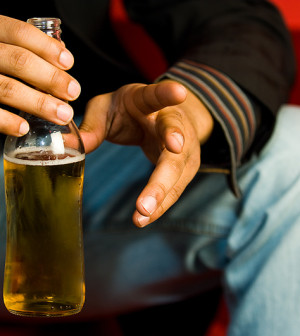- Could Your Grocery Store Meat Be Causing Recurring UTIs?
- Are You Making This Expensive Thermostat Error This Winter?
- Recognizing the Signs of Hypothyroidism
- 10 Strategies to Overcome Insomnia
- Could Artificial Sweeteners Be Aging the Brain Faster?
- Techniques for Soothing Your Nervous System
- Does the Water in Your House Smell Funny? Here’s Why
- Can a Daily Dose of Apple Cider Vinegar Actually Aid Weight Loss?
- 6 Health Beverages That Can Actually Spike Your Blood Sugar
- Treatment Options for Social Anxiety Disorder
Alcohol Plus Heart Rhythm Disorder Ups Stroke Risk: Study

Excessive alcohol consumption and age may increase risk of stroke in people with a common heart rhythm disorder called atrial fibrillation, a new study finds.
“Doctors should ask their [atrial fibrillation] patients about alcohol use and advise patients to cut down if they are drinking more than is recommended,” said Dr. Faris Al-Khalili, who led the study. Al-Khalili is a cardiologist at Karolinska Institute in Stockholm, Sweden.
The study included more than 25,000 Swedish adults, ages 18-64, with atrial fibrillation that wasn’t related to valve problems. Atrial fibrillation increases odds of stroke, but because these patients had few additional risk factors, they were considered at low risk for ischemic stroke (blocked blood flow to the brain).
Over a follow-up of about five years, the researchers found two factors were significantly associated with increased stroke risk: alcohol-related hospitalization — which doubled risk — and age.
Use of blood-thinning medication was associated with a lower risk, according to the study presented Saturday at the annual meeting of the European Society of Cardiology, in Rome.
“Even though these patients are classified as low-risk, the incidence of ischemic stroke in our study population is neither negligible nor ignorable and it carries a relatively high mortality,” Al-Khalili said in a society news release.
“Our study found that alcohol is an independent risk factor for stroke in patients with [atrial fibrillation],” Al-Khalili said.
How the relationship works isn’t clear, however, and the study was observational, meaning it can’t prove a direct cause-and-effect relationship.
Alcohol might induce atrial fibrillation, leading to stroke, or there could be a specific alcohol effect that causes systemic or cerebral clots, the researchers suggested.
“Using alcohol-related hospitalization as a proxy for alcohol abuse likely underestimates the extent of the problem, and does not allow grading of the amount of alcohol consumed,” Al-Khalili said.
He added that the beneficial link between blood thinners and stroke in these patients needs further investigation, particularly with respect to benefits versus harms, such as bleeding.
Research presented at meetings is usually considered preliminary until published in a peer-reviewed medical journal.
More information
The U.S. National Heart, Lung, and Blood Institute has more on atrial fibrillation.
Source: HealthDay
Copyright © 2026 HealthDay. All rights reserved.










